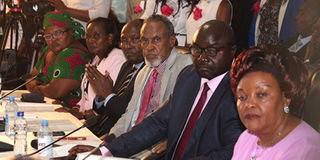BBI: How we did it, lucrative ‘offers’ and political intrigues

Building Bridges Initiative (BBI) committee meets with women's group Embrace Kenya at KICC, Nairobi, on August 8, 2019. They say they did not condone interference. PHOTO | FILE | NATION MEDIA GROUP
What you need to know:
- So determined was the leadership to guard against infiltration that members were required to leave their phones out of the meeting venue.
- Chairman Haji said the team has proved that the solution to all the problems the country face today can be tackled through dialogue.
Before getting down to work after their gazettement by President Uhuru Kenyatta in May last year, a high-ranking government official opposed to the ‘handshake’ sought a secret meeting with a section of the Building Bridges Task Force, the Sunday Nation can reveal.
Some of those who were approached and agreed to speak to us in confidence disclosed that the individual, through proxies who made it clear whom they were working for, wanted to establish ‘a working relationship’ with them as they conducted the Building Bridges Initiative (BBI) business.
The members were approached separately and when some shared their experiences thinking it was unique to them, it became a plenary matter and one of the first orders of business to transact.
It was discussed and a common position was taken not to entertain such. “Lucrative offers were made but we were guided by our conscience. We did this in the interest of the country,” one of them said.
DROP PREJUDICES
While some flatly rejected the offer on account it would amount to betraying the President and Mr Raila Odinga, his fierce challenger in the August 2017 polls who had now agreed on a political truce, the rest knew that their every action was being monitored by the State.
And unbeknown to many of them, most of those helping with the clerical work as well as other officers assigned to task force members were seconded from the National Intelligence Service.
Initially, suspicion was rife and akin to the Serena talks in 2007/08 that paved the way for the creation of coalition government in April 2008, the proposal had been that the seat of chairperson be held on rotational basis-between those seconded by Mr Kenyatta and those by Mr Odinga, interchangeably.
But aware that doing so would further entrench the mistrust, the team settled for a permanent chairman in Yusuf Haji, 78, a former administrator.
“Before getting down to work, we had to first surrender our personal political opinions and biases. We had to also erase from our minds whoever we thought had proposed our names to the task force to focus on the mission ahead,” Mr Paul Mwangi, the BBI secretary, said.
CONSENSUS
Mr Haji, a former Provincial Commissioner, refused to comment on reports of attempted interference at formative stages of the team.
Predictably, expected to make drastic changes with far-reaching implications on how the country is governed going forward, all the politicians nursing presidential ambitions have keenly followed the work of the BBI intending to influence some of its recommendations.
Living up to its building bridges name, they established that all the decisions contained in the final report were arrived at through consensus.
“Whenever we encounter a matter on which opinion was divided, we allocated it more time, discussed extensively until the impasse was broken. Each time, what is good for the country carried the day,” said Mr Mwangi.
So determined was the leadership to guard against infiltration that members were required to leave their phones out of the meeting venue.
They were alive to the fact that some members may have been tempted to record deliberations and share with outsiders, another source told us.
RUTO MOLES
They have successfully managed to keep their meeting venues, other than the Kenyatta International Conference Centre, in Kilimani and Runda, all in Nairobi, away from the public.
But still, the Sunday Nation is aware that Deputy President William Ruto’s camp had moles within the task force who kept him updated on every crucial decision made so much so that his remarks throughout his whirlwind tours of the country have been informed by the insider information.
“We have seen the draft and some of their proposals cannot be implemented,” a high-ranking member of DP’s war council told this writer through a short message Saturday.
Chairman Haji said the team has proved that the solution to all the problems the country face today can be tackled through dialogue.
“We may not have been a homogenous team given our differing political backgrounds before the President and the former Prime Minister appointed the team, but the swiftness with which we gelled and got down to work and the commitment displayed is quite humbling. Kenyans should learn from this,” said Garissa Senator.
INTERFERENCE
Despite the team insisting that consultation with the appointing authority was minimal and only restricted on logistics, independent inquiry points to a different reality.
In many occasions, Senator Haji or his vice chairman Adams Oloo had to vacate the chair to urgently receive phone calls from State operatives as well as people from Mr Odinga’s office keen on tracking progress.
While Mr Mwangi denies any interference from the bosses, the truth is the principals have been keen throughout the process, to know and sometimes suggest either directly or through proxies what they think would cure the country.
“We were not going to push predetermined positions. We assured the team that at no time were we going force on them decisions already agreed upon from elsewhere. We thank the President and the Right Honourable Odinga for giving us a free hand,” said Mr Mwangi.





